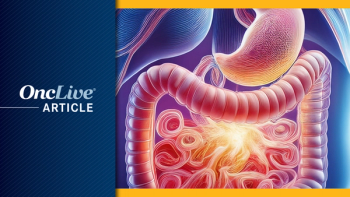
Trastuzumab Deruxtecan Improves Survival in Heavily Pretreated HER2+ Gastric/GEJ Cancer
Trastuzumab deruxtecan (Enhertu) improved overall survival versus chemotherapy in patients with heavily pretreated unresectable or metastatic HER2-positive gastric or gastroesophageal junction cancer.
José Baselga, MD, PhD
Trastuzumab deruxtecan (Enhertu) improved overall survival (OS) versus chemotherapy in patients with heavily pretreated unresectable or metastatic HER2-positive gastric or gastroesophageal junction (GEJ) cancer, according to topline findings from the phase II DESTINY-Gastric01 trial.1
Patients enrolled on the trial had tumors that progressed after at least 2 treatment regimens, including trastuzumab (Herceptin) and chemotherapy. AstraZeneca and Daiichi Sankyo Company, Limited, the codevelopers of trastuzumab deruxtecan, also reported that the antibody-drug conjugate met the primary endpoint of the trial by inducing a clinically meaningful improvement in objective response rate (ORR) versus chemotherapy.
The companies also reported that the safety and tolerability data for trastuzumab deruxtecan were similar to previously published findings from a phase I trial in this patient population.
“Gastric cancer is usually diagnosed in the advanced stage and patients face markedly high mortality rates, making the need for new therapies especially urgent. Given the previous results seen in our HER2-positive development program and now in HER2-positive metastatic gastric cancer, we believe this antibody-drug conjugate has the potential to redefine the treatment of patients with HER2-expressing cancers,” José Baselga, MD, PhD, executive vice president, Oncology R&D, AstraZeneca, said in a press release.
The open-label, multicenter phase II DESTINY-Gastric01 trial included 189 Japanese and South Korean patients with HER2-expressing (IHC3+ or IHC2+/ISH+) advanced gastric/GEJ adenocarcinoma with progression on at least 2 prior regimens, including trastuzumab and 5-FU and platinum chemotherapy. In a 2:1 randomization, patients received either trastuzumab deruxtecan at 6.4 mg/kg once every 3 weeks or physician’s choice of paclitaxel or irinotecan monotherapy on the same schedule. Beyond the ORR primary endpoint, secondary outcome measures included OS, progression-free survival (PFS), duration of response, disease control rate, time to treatment failure, and safety/pharmacokinetics.
AstraZeneca and Daiichi Sankyo plan to present the results from DESTINY-Gastric01 at an upcoming medical meeting. The companies also intend to discuss the data with regulatory authorities in Japan and other countries.
Previously reported data from a phase I trial showed that trastuzumab deruxtecan induced a confirmed ORR of 43.2% (n = 19) and a disease control rate (DCR) of 79.5% among 44 evaluable patients with HER2-positive gastric/GEJ cancer.2 Among 24 patients who received prior irinotecan treatment, the ORR and DCR were 41.7% (n = 10) and 79.2%, respectively.
Patients received trastuzumab deruxtecan at a dose of 5.4 mg/kg or 6.4 mg/kg. The median patient age was 68 years, 73.3% had an ECOG performance status of 0, and 26.7% had an ECOG performance status of 1.
HER2 expression per IHC was 3+ in 82% of patients and 2+ in 18% of patients. More than one-fourth (26.7%) of patients had received 5 or more prior anticancer regimens. All patients had prior trastuzumab. The median number of prior lines of therapy was 3.
At the data cutoff, the median OS was 12.8 months, the median PFS was 5.6 months, and the median duration of response was 7.0 months. The vast majority (80%) of patients experienced tumor shrinkage.
Most treatment-emergent adverse events (TEAEs) were grade 3 or lower. The most common (≥5%) grade 3 nonhematologic AEs included decreased appetite (7%), hypokalemia (7%), hyponatremia (7%), and cholangitis (5%). Grade 4 nonhematologic TEAEs included 2 cases of grade 4 hypokalemia.
Grade 3 hematologic TEAEs included anemia (30%), decreased platelet count (14%), decreased WBC count (11%), decreased neutrophil count (16%), and decreased lymphocyte count (9%). Grade 4 hematologic TEAEs included 2 cases each of grade 4 decreased platelet count, decreased WBC count, and decreased neutrophil count.
Drug-related TEAEs led to treatment discontinuation in 5 patients: pneumonitis (n = 3), decreased appetite (n = 1), and decreased platelet count (n = 1).
In December 2019, the
References
- Phase II DESTINY-Gastric01 trial of Enhertu versus chemotherapy met primary endpoint [news release]. AstraZeneca; January 27, 2020. bit.ly/37HPmG1. Accessed January 27, 2020.
- Shitara K, Iwata H, Takahashi S, et al. Trastuzumab deruxtecan (DS-8201a) in patients with advanced HER2-positive gastric cancer: a dose-expansion, phase 1 study. Lancet Oncol. 2019;20(6):827-836. doi: 10.1016/S1470-2045(19)30088-9.


































